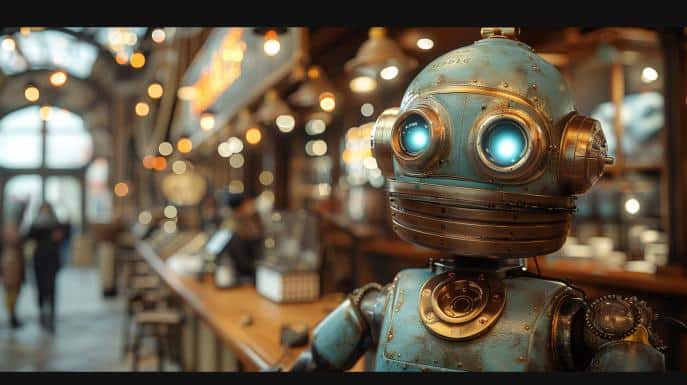Amid the pulsing silence of progress, we watch the intriguing dance of robotics on the stage of our daily lives. Robots, once confined to the pages of science fiction, now play indispensable roles across multiple sectors, silently reshaping the fabric of industries with the subtlety of a crescendo symphony. In the article “Robotics in Everyday Life: Sectors in Transformation”, we will explore how these mechanical beings are woven into our everyday lives and operating beyond our capabilities, extending the frontiers of human creativity and operational efficiency. Come discover how, in the shadow of our routines, robots are changing industries and, perhaps, the course of our very existence.
How are Robotics Integrated into Our Daily Life?
In the industrial sector, robotics has completely reshaped the industrial automation. A operational efficiency with robots has intensified due to the increasing presence of collaborative robots (cobots), who work side by side with humans in factories, improving not only production but also the safety of the working environment. The use of robots in factories is a clear example of process robotization to modify traditional production paradigms. As demonstrated in examples of everyday use of robots, they are fundamental in activities such as assembling vehicles and organizing inventories in large distribution centers, enhancing human action with unparalleled precision and regularity.
How have Robotics Transformed the Industrial Sector?
A industrial automation plays a fundamental role in redefining production lines. The insertion of industrial robots optimized the operational efficiency with robots, allowing precise, high-performance machines to perform tasks uninterruptedly. This advancement, triggered by significant progress in artificial intelligence, revolutionizes processes and raises production and safety standards. However, automation also promotes a reconfiguration of professional roles.
What Are the Current Trends in Robotics in Various Sectors?
Advanced robotics and technological innovation are being applied in several sectors, but especially in manufacturing, introducing radical changes. Integration with the Internet of Things (IoT) is improving operational efficiency, with smarter and more connected production systems. In logistics, supply chain automation is a visible reality, where precise and autonomous machines revolutionize work processes.
In this context, advances and emerging trends open up innovative opportunities in manufacturing and logistics. Through these technologies, industries are experiencing a significant increase in efficiency and safety while also facing the challenge of job displacement. Advanced robotics is constantly evolving, optimizing not only the time and cost of operations but also the quality of the final work performed.
What Challenges and Opportunities Does Robotics Present for the Future of Work?
The constant evolution of robotics encourages a live debate on the impact of robotics on employability and the emergence of new technical functions. While some warn of possible professional displacement, others see automation increasing the creation of specialized jobs. The core of the discussion revolves around changes in the job market imposed by automation and employability.
This transition challenges the current educational system, which needs to adapt, providing education for robotic automation, preparing the professionals of tomorrow. The challenge is to cultivate skills that complement and effectively interfere with the capabilities of robots. Success in this area can transform challenges into opportunities for professional and personal development.
Throughout this article, we explore the intersection between robotics and everyday life, from its domestic uses to the transformation of the industrial sector and the innovative trends that are emerging. We look at how cobots are reshaping human-machine collaboration and how the implementation of AI is elevating operational efficiency. Furthermore, we debate the challenges and opportunities brought by robotics to the future of work, including the implications for employability and education. We reflect on how robotics is not only a disruptive force, but also an invitation to adapt and grow, guiding us towards a future where technology and humanity progress side by side. The dialogue between machines and our everyday lives looks set to deepen, highlighting the importance of looking ahead with curiosity and adaptive hope.
FAQ: How are Robotics Integrated into Our Daily Life?
1. How has the presence of cobots in factories impacted industrial production?
The presence of collaborative robots (cobots) in factories has significantly increased operational efficiency, promoting improvements in terms of production and safety in the work environment.
2. What is the role of industrial automation in the transformation of production lines?
Industrial automation, driven by advances in artificial intelligence, has transformed production lines, optimizing operational efficiency and raising production and safety standards.
3. What are the main trends in robotics that are changing different sectors?
The main trends in robotics include integration with the Internet of Things (IoT), which improves operational efficiency, and automation in logistics, representing a revolution in work processes.
4. How are advanced robotics influencing the future of work?
Advanced robotics is sparking discussions about the impact on employability, where there may be both a displacement of jobs and the creation of new specialized positions, significantly changing the job market.
5. What challenges does the evolution of robotics present for the current educational system?
The educational system faces the challenge of adapting, providing education focused on robotic automation and developing skills that complement the work of robots, aiming to prepare professionals for the future.



